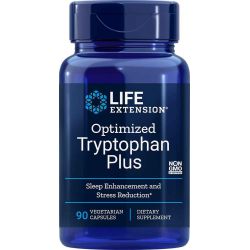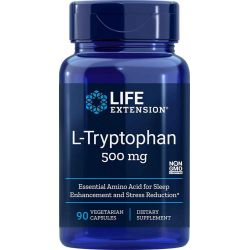Tryptophan. Why Aging People Become Depressed, Fatigued, and Overweight part 1
 Serotonin is a compound in the brain that promotes feelings of personal security, relaxation, and confidence. A serotonin deficiency can result in sleep disturbance, anxiety, depression, and a propensity to overeat, particularly carbohydrates like simple sugars.
Serotonin is a compound in the brain that promotes feelings of personal security, relaxation, and confidence. A serotonin deficiency can result in sleep disturbance, anxiety, depression, and a propensity to overeat, particularly carbohydrates like simple sugars.
Startling research reveals that serotonin levels decline as we age!1-3 These findings provide a biochemical rationale to explain common age-related disorders such as depressed mood and sleep difficulties. Based on these discoveries, aging people may appreciably improve their health by restoring serotonin to youthful levels.
The amino acid tryptophan is needed to produce serotonin in the brain.4 While the amount of tryptophan in a typical diet meets basic metabolic requirements, it often fails to provide optimal brain serotonin levels.
Ever since the FDA restricted the importation of tryptophan for use in dietary supplements, there has been an upsurge in the percentage of overweight and obese Americans.
One could argue that a widespread serotonin deficiency is at least partially responsible for the record numbers of depressed, sleep-deprived, and overweight individuals.
Why Dietary Tryptophan Is Inadequate
 Tryptophan is one of the eight essential amino acids found in the human diet. Essential amino acids are defined as those that cannot be made in the body and therefore must be obtained from food or supplements. (A ninth amino acid, histidine, is sometimes considered essential for children.)
Tryptophan is one of the eight essential amino acids found in the human diet. Essential amino acids are defined as those that cannot be made in the body and therefore must be obtained from food or supplements. (A ninth amino acid, histidine, is sometimes considered essential for children.)
Our bodies do need additional amino acids, but these other amino acids are made from the eight essential amino acids when we are in optimal health.
In any normal diet, be it omnivorous or vegetarian, tryptophan is the least plentiful of all amino acids. A typical diet provides only 1,000 to 1,500 mg/day of tryptophan, yet there is much competition in the body for this scarce tryptophan.
Tryptophan is used to make various protein structures of the body. In people with low-to-moderate intakes of vitamin B3(niacin), tryptophan may be used to make B3 in the liver at the astounding ratio of 60 mg tryptophan to make just 1 mg of vitamin B3.5
Yet even maintaining a minute amount of tryptophan provides little benefit in boosting serotonin in the brain due to competition with other amino acids for transport through the blood-brain barrier. Nutrients must be taken up through the blood-brain barrier by transport molecules. Tryptophan competes for these transport molecules with other amino acids.
As one can see, diet-derived tryptophan contributes very little actual tryptophan to the brain. As you will soon read, even eating tryptophan-containing foods like turkey may not always provide the body with enough of this essential amino acid. One reason is that aging people make enzymes that rapidly degrade tryptophan in the body.
Remember, tryptophan is the only normal dietary raw material for serotonin synthesis in the brain. Given all we now know about the difficulty in maintaining adequate tryptophan status, is it any wonder that so many aging humans suffer from disorders such as depression, insomnia, and excess weight gain associated with a serotonin deficiency?
- Tryptophan
- Threonine

- Lysine
- Valine
- Methionine
- Isoleucine
- Phenylalanine
- Leucine
How Tryptophan Functions in the Body
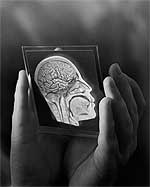 It has been shown in human clinical studies that low levels of tryptophan contribute to insomnia.9 Increasing tryptophan may help to normalize sleep patterns.10-12 It is known that raising tryptophan levels in the body may decrease cravings and binge eating—especially for carbohydrates—and help people lose weight.13,14
It has been shown in human clinical studies that low levels of tryptophan contribute to insomnia.9 Increasing tryptophan may help to normalize sleep patterns.10-12 It is known that raising tryptophan levels in the body may decrease cravings and binge eating—especially for carbohydrates—and help people lose weight.13,14
L-tryptophan serves as a precursor not only to serotonin, but also melatonin and niacin. Serotonin is a major neurotransmitter involved in many somatic and behavioral functions including mood, appetite and eating behavior, sleep, anxiety, and endocrine regulation.6,15-17
There are two possible sources for L-tryptophan: diet and tissue proteins, from which L-tryptophan has been recycled during protein turnover. Aging, chronic inflammatory diseases, and HIV infection are associated with tryptophan depletion, even in the absence of dietary tryptophan deficiency.
An adult male needs 250 mg a day of tryptophan just to maintain nitrogen balance.18 While a normal diet contains 1,000 to 1,500 mg of tryptophan per day,19 the enzymatic breakdown of tryptophan increases with age,20 and certain disease states can severely deplete tryptophan.
How Tryptophan is Metabolized in the Body
There are three potential fates for L-tryptophan once ingested:
- Incorporation into body tissue proteins.
- Conversion into serotonin (and melatonin).
- Conversion into indoleamines, carbon dioxide, water, adenosine triphosphate (ATP), and niacin.21
For every nutrient absorbed into the body, there are specific enzymes that convert the nutrient into other substances. There are two specific enzymes that can deprive the body of sufficient amounts of tryptophan. These enzymes are called L-tryptophan 2,3-dioxygenase (TDO) and indoleamine 2,3-dioxygenase (IDO).
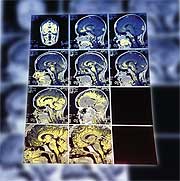 The liver enzyme TDO is induced when plasma concentrations of L-tryptophan exceed those needed for conversion into serotonin and/or protein. This enzyme oxidizes surplus L-tryptophan into carbon dioxide, water, and ATP.22,23
The liver enzyme TDO is induced when plasma concentrations of L-tryptophan exceed those needed for conversion into serotonin and/or protein. This enzyme oxidizes surplus L-tryptophan into carbon dioxide, water, and ATP.22,23
The other tryptophan-degrading enzyme IDO is more insidious because it can degrade L-tryptophan even when circulating levels of L-tryptophan are low.23,24
This enzyme has been found outside the liver on macrophages and dendritic cells and is increased in pro-inflammatory states, HIV infection, and normal aging.25-30
Once the TDO or IDO enzymes act on tryptophan, it is no longer available for conversion to serotonin or incorporation into protein. Consuming large amounts of oral L-tryptophan will not generate more serotonin because more TDO will be induced to deplete the tryptophan.
Tryptophan and its metabolite 5-hydroxytryptophan (5-HTP) are taken up into the brain across the blood-brain barrier by a transport system that is active towards all the large neutral amino acids.31 The affinity of the various amino acids for the carrier is such that there is competition between the large neutral amino acids for entry into brain. In fact, the best predictor of a given meal’s effect on brain tryptophan-serotonin levels is the serum ratio of tryptophan to the pool of large neutral amino acids.32
More clinically relevant, however, is that serotonin levels are enhanced by carbohydrate ingestion.33 The reason is that the high amount of insulin released in response to carbohydrate ingestion accelerates the serum removal of valine, leucine, and isoleucine that compete against tryptophan for transport into the brain. Similarly, a higher percentage of protein in the diet slows serotonin elevation (by providing competing amino acids for the blood-brain barrier).34,35
Giving tryptophan with an inhibitor of the TDO enzyme would enable lower doses of tryptophan to be used. In the rat, high doses of pyridoxine (vitamin B6) can inhibit tryptophan catabolism in the liver and increase uptake of tryptophan into the brain.36 While the effect of high doses of pyridoxine on plasma tryptophan has not been studied in humans, pyridoxine should be given with tryptophan for another reason. When tryptophan was given to normal subjects for a week, levels of tryptophan metabolites in the plasma increased indicating that tryptophan was being broken down. This effect could be attenuated by pyridoxine (pyridoxine assists the breakdown of the tryptophan metabolite kynurenine, which can compete with tryptophan for uptake into the brain), suggesting that chronic tryptophan treatment increases pyridoxine requirements.37
-
Serotonin is a brain biochemical that promotes restful sleep, well-being, and satiety. When serotonin levels are low, people often experience depression, anxiety, insomnia, and the urge to overeat.
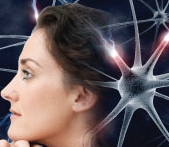
- The amino acid tryptophan is needed to produce serotonin in the body. While foods contain some tryptophan, the diet may not provide enough tryptophan to make adequate amounts of serotonin. Additionally, enzymes that are influenced by inflammation and aging can break down tryptophan before it converts to serotonin.
-
Individuals suffering from the adverse effects of low serotonin levels can now restore sleep, appetite control, and mood by supplementing with an advanced L-tryptophan formulation. This formula combines L-tryptophan with nutrients and herbs that help optimize its ability to convert to beneficial serotonin in order to counteract appetite and sleep disorders, and low mood.
Clinical Implications: Sleep Disorders
 Tryptophan has been researched for sleep disorders for 30 years. Improvement of sleep normalcy has been noted38 at doses as low as 1,000 mg.19 Increased stage 4 sleep has been noted at even lower doses—as low as 250 mg tryptophan.19 Significant improvement in obstructive sleep apnea, but not central sleep apnea, has been noted at doses of 2,500 mg at bedtime, with those experiencing the most severe apnea demonstrating the best response.39 While many sedative medications have opioid-like effects, L-tryptophan administration does not limit cognitive performance or inhibit arousal from sleep.40
Tryptophan has been researched for sleep disorders for 30 years. Improvement of sleep normalcy has been noted38 at doses as low as 1,000 mg.19 Increased stage 4 sleep has been noted at even lower doses—as low as 250 mg tryptophan.19 Significant improvement in obstructive sleep apnea, but not central sleep apnea, has been noted at doses of 2,500 mg at bedtime, with those experiencing the most severe apnea demonstrating the best response.39 While many sedative medications have opioid-like effects, L-tryptophan administration does not limit cognitive performance or inhibit arousal from sleep.40
L-tryptophan depletion negatively impacts sleep. A significant decrease in serum tryptophan levels after a tryptophan-free amino acid drink was associated with an adverse effect upon sleep parameters (stage 1 and stage 2 time, and rapid eye movement sleep time).9 L-tryptophan is not associated with tolerance or difficulty with morning wakening and has been shown to be efficacious for sleep in several clinical trials of various designs and L-tryptophan dosages.
Depression
 As previously mentioned, L-tryptophan is essential for the brain to synthesize serotonin, a neurotransmitter that has been shown to affect mood. Several studies have shown that acute tryptophan depletion can cause a depressive state in humans, especially patients who are in remission from depression.41,42 In a study of the effects of acute tryptophan depletion on healthy women and patients with bulimia nervosa, both groups were given amino acid mixtures to consume to decrease their plasma tryptophan levels. In both groups an increase in depression occurred.43
As previously mentioned, L-tryptophan is essential for the brain to synthesize serotonin, a neurotransmitter that has been shown to affect mood. Several studies have shown that acute tryptophan depletion can cause a depressive state in humans, especially patients who are in remission from depression.41,42 In a study of the effects of acute tryptophan depletion on healthy women and patients with bulimia nervosa, both groups were given amino acid mixtures to consume to decrease their plasma tryptophan levels. In both groups an increase in depression occurred.43
Plasma L-tryptophan levels can be raised through dietary intake of L-tryptophan, which raises serotonin levels in the brain, and thereby lessens the depressive state.44 In a study involving recovering alcoholic patients, it was found that the participants had severely depleted L-tryptophan levels accompanied by a high level of depressive state. When the patients were given supplemental doses of L-tryptophan over a short period of time, their depressive state lessened significantly.45 The tryptophan metabolite, 5-hydroxytryptophan (5-HTP), has shown significant clinical response for depression in 2-4 weeks, at doses of 50-300 mg three times daily.46-48
Premenstrual Syndrome
A daily dose of 6,000 mg of L-tryptophan significantly decreased mood swings, tension, and irritability in women with premenstrual syndrome.49 The meta-bolism of tryptophan is impacted by the different phases of a woman’s cycle,50 and therefore hormonal changes during the menstrual cycle may negatively affect the availability of tryptophan for conversion into serotonin.
Carbohydrate Cravings and Weight Loss
 Some obese people consume carbohydrate-rich foods frequently and preferentially, because they have a persistently low plasma tryptophan ratio, as well as low tryptophan uptake into the brain.51 Remember that serotonin levels are enhanced by carbohydrate ingestion as insulin release accelerates the serum removal of other amino acids that compete for transport through the blood-brain barrier.
Some obese people consume carbohydrate-rich foods frequently and preferentially, because they have a persistently low plasma tryptophan ratio, as well as low tryptophan uptake into the brain.51 Remember that serotonin levels are enhanced by carbohydrate ingestion as insulin release accelerates the serum removal of other amino acids that compete for transport through the blood-brain barrier.
Increasing the L-tryptophan levels in blood plasma is also known to have an appetite-suppressing effect that mainly impacts carbohydrate consumption.52,53 Presumably the supplemental tryptophan would enhance the release of serotonin from brain neurons to diminish appetite for carbohydrates, which helps with loss of body weight. In addition, obese subjects are often insulin-resistant, and diminished insulin action may cause low plasma tryptophan ratios33 because of the peripheral effects of insulin on the uptake and utilization of other amino acids.
A study was done to measure L-tryptophan in the blood plasma of obese patients to assess the plasma tryptophan ratio to large neutral amino acids (tyrosine + phenylalanine + leucine + isoleucine + valine). The results showed the plasma tryptophan ratio was well below the normal ratio for humans.51 If elevation of the tryptophan in relation to large neutral amino acids occurs, more tryptophan is allowed into the brain to induce serotonin synthesis and influence functions of serotonin (mood, appetite, sleep, and hunger). This study helps show why obese people often have uncontrollable appetites, i.e., they have too little tryptophan in relation to other large neutral amino acids in their blood.
When these obese patients were given 1,000 mg, 2,000 mg, or 3,000 mg doses of L-tryptophan one hour before meals to raise the amount of tryptophan relative to the large neutral amino acids, a significant decrease in caloric consumption was observed. The majority of the reduction in caloric intake was due to the amount of carbohydrates, not protein, consumed. The only side effects observed were a mild decrease in mental alertness, mild dizziness, and mild drowsiness.54
In a double-blind, placebo-controlled study, obese patients on protein-rich diets who received tryptophan (750 mg twice daily orally) had significant weight loss, compared with a placebo group. A moderate dose of tryptophan supplementation did not cause any side effects such as mid-day sleepiness or fatigue.55 The effects of reducing tryptophan levels were also studied in a 7-year-old girl with severe anorexia. When tryptophan levels were reduced, spontaneous eating occurred for the first time in 4.5 years. The spontaneous eating ceased when the tryptophan intake was increased.56
How Aging Reduces Tryptophan-Serotonin Levels
 As a result of normal aging, inflammatory cytokine levels increase. A little-known adverse effect is that inflammatory cytokines (such as tumor necrosis factor alpha and interferon alpha) cause induction of the tryptophan-degrading enzyme IDO (indoleamine 2,3-dioxygenase).
As a result of normal aging, inflammatory cytokine levels increase. A little-known adverse effect is that inflammatory cytokines (such as tumor necrosis factor alpha and interferon alpha) cause induction of the tryptophan-degrading enzyme IDO (indoleamine 2,3-dioxygenase).
You might think that aging people could compensate for the tryptophan-degrading effects of IDO by consuming higher doses of tryptophan supplements. The problem is that in the presence of high blood levels of tryptophan, the other tryptophan-degrading enzyme TDO is also elevated.
So consuming large amounts of L-tryptophan (oral doses of 4,000 mg and greater) will not generate more serotonin because TDO will be induced. Yet if aging people fail to get more tryptophan into their bodies, brain serotonin levels will plummet because the higher IDO enzyme activity will degrade what little tryptophan remains in the blood.
Material used with permission of Life Extension. All rights reserved.
1. Payton A, Gibbons L, Davidson Y, et al. Influence of serotonin transporter gene polymorphisms on cognitive decline and cognitive abilities in a nondemented elderly population. Mol Psychiatry. 2005 Dec;10(12):1133-9.
2. Meltzer CC, Price JC, Mathis CA, et al. Serotonin 1A receptor binding and treatment response in late-life depression. Neuropsychopharmacology. 2004 Dec;29(12):2258-65.
3. Meltzer CC, Smith G, DeKosky ST, et al. Serotonin in aging, late-life depression, and Alzheimer’s disease: the emerging role of functional imaging. Neuropsychopharmacology. 1998 Jun;18(6):407-30.
4. Fernstrom JD, Wurtman RJ. Brain serotonin content: physiological dependence on plasma tryptophan levels. Science. 1971 Jul 9;173(992):149-52.
5. Fukuwatari T, Ohta M, Kimtjra N, Sasaki R, Shibata K. Conversion ratio of tryptophan to niacin in Japanese women fed a purified diet conforming to the Japanese Dietary Reference Intakes. J Nutr Sci Vitaminol (Tokyo). 2004 Dec;50(6):385-91.
6. Bell C, Abrams J, Nutt D. Tryptophan depletion and its implications for psychiatry. Br J Psychiatry. 2001 May;178:399-405.
7. Juhl JH. Fibromyalgia and the serotonin pathway. Altern Med Rev. 1998 Oct;3(5):367-75.
8. Cangiano C, Ceci F, Cairella M, et al. Effects of 5-hydroxytryptophan on eating behavior and adherence to dietary prescriptions in obese adult subjects. Adv Exp Med Biol. 1991;294:591-3.
9. Riemann D, Feige B, Hornyak M, Koch S, Hohagen F, Voderholzer U. The tryptophan depletion test: impact on sleep in primary insomnia – a pilot study. Psychiatry Res. 2002 Mar 15;109(2):129-35.
10. Demisch K, Bauer J, Georgi K, Demisch L. Treatment of severe chronic insomnia with L-tryptophan: results of a double-blind cross-over study. Pharmacopsychiatry. 1987 Nov;20(6):242-4.
11. Hartmann E, Lindsley JG, Spinweber C. Chronic insomnia: effects of tryptophan, flurazepam, secobarbital, and placebo. Psychopharmacology (Berl). 1983;80(2):138-42.
12. Schneider-Helmert D. Interval therapy with L-tryptophan in severe chronic insomniacs. A predictive laboratory study. Int Pharmacopsychiatry. 1981;16(3):162-73.
13. Gendall KA, Joyce PR. Meal-induced changes in tryptophan:LNAA ratio: effects on craving and binge eating. Eat Behav. 2000 Sep;1(1):53-62.
14. Ashley DV, Fleury MO, Golay A, Maeder E, Leathwood PD. Evidence for diminished brain 5-hydroxytryptamine biosynthesis in obese diabetic and non-diabetic humans. Am J Clin Nutr. 1985 Dec;42(6):1240-5.
15. Schloss P, Williams DC. The serotonin transporter: a primary target for antidepressant drugs. J Psychopharmacol. 1998;12(2):115-21.
16. Gross C, Zhuang X, Stark K, et al. Serotonin1A receptor acts during development to establish normal anxiety-like behaviour in the adult. Nature. 2002 Mar 28;416(6879):396-400.
17. Available at: http://www.acnp.org/Docs/G5/CH2_15-34.pdf . Accessed January 5, 2008.
18. Altman PL, Dittmer DS (Editors). Metabolism Bethesda, Maryland: Federation of American Societies for Experimental Biology, 1968.
19. Hartmann E, Spinweber CL. Sleep induced by L-tryptophan. Effect of dosages within the normal dietary intake. J Nerv Ment.Dis. 1979 Aug;167(8):497-9.
20. Kepplinger B, Baran H, Kainz A, et al. Age-related increase of kynurenic acid in human cerebrospinal fluid – IgG and beta2-microglobulin changes. Neurosignals. 2005;14(3):126-35.
21. Sainio E-L, Pulkki K, Young SN. L-tryptophan: biochemical, nutritional and pharmacological aspects. Amino Acids. 1996 Mar;10(1):21-47.
22. Li JS, Han Q, Fang J, Rizzi M, James AA, Li J. Biochemical mechanisms leading to tryptophan 2,3-dioxygenase activation. Arch Insect Biochem Physiol. 2007 Feb;64(2):74-87.
23. Brown RR, Ozaki Y, Datta SP, et al. Implications of interferon-induced tryptophan catabolism in cancer, auto-immune diseases and AIDS. Adv Exp Med Biol. 1991;294:425-35.
24. MacKenzie CR, Heseler K, Müller A, Däubener W. Role of indoleamine 2,3-dioxygenase in antimicrobial defence and immuno-regulation: tryptophan depletion versus production of toxic kynurenines. Curr Drug Metab. 2007 Apr;8(3):237-44.
25. Schrocksnadel K, Wirleitner B, Winkler C, Fuchs D. Monitoring tryptophan metabolism in chronic immune activation. Clin Chim Acta. 2006 Feb;364(1-2):82-90.
26. Schroecksnadel K, Zangerle R, Bellmann-Weiler R, et al. Indoleamine-2, 3-dioxygenase and other interferon-gamma-mediated pathways in patients with human immunodeficiency virus infection. Curr Drug Metab. 2007 Apr;8(3):225-36.
27. Boasso A, Herbeuval JP, Hardy AW, et al. HIV inhibits CD4+ T-cell proliferation by inducing indoleamine 2,3-dioxygenase in plasmacytoid dendritic cells. Blood. 2007 Apr 15;109(8):3351-9.
28. Potula R, Poluektova L, Knipe B, et al. Inhibition of indoleamine 2,3-dioxygenase (IDO) enhances elimination of virus-infected macrophages in an animal model of HIV-1 encephalitis. Blood. 2005 Oct 1;106(7):2382-90.
29. Frick B, Schroecksnadel K, Neurauter G, Leblhuber F, Fuchs D. Increasing production of homocysteine and neopterin and degradation of tryptophan with older age. Clin Biochem. 2004 Aug;37(8):684-7.
30. Pertovaara M, Raitala A, Lehtimaki T, et al. Indoleamine 2,3-dioxygenase activity in nonagenarians is markedly increased and predicts mortality. Mech Ageing Dev. 2006 May;127(5):497-9.
31. Oldendorf WH, Szabo J. Amino acid assignment to one of three blood-brain barrier amino acid carriers. Am J Physiol. 1976 Jan;230(1):94-8.
32. Lucini V, Lucca A, Catalano M, Smeraldi E. Predictive value of tryptophan/large neutral amino acids ratio to antidepressant response. J Affect Disord. 1996 Jan 22;36(3-4):129-33.
33. Wurtman RJ, Wurtman JJ. Brain serotonin, carbohydrate-craving, obesity and depression. Obes Res. 1995 Nov;3 Suppl 4477S-80S.
34. Lieberman HR, Caballero B, Finer N. The composition of lunch determines afternoon plasma tryptophan ratios in humans.J Neural Transm. 1986;65(3-4):211-7.
35. Heraief E, Burckhardt P, Mauron C, Wurtman JJ, Wurtman RJ. The treatment of obesity by carbohydrate deprivation suppresses plasma tryptophan and its ratio to other large neutral amino acids. J Neural Transm. 1983;57(3):187-95.
36. Bender DA, Totoe L. High doses of vitamin B6 in the rat are associated with inhibition of hepatic tryptophan metabolism and increased uptake of tryptophan into the brain. J Neurochem. 1984 Sep;43(3):733-6.
37. Green AR, Aronson JK. Metabolism of an oral tryptophan load III: effect of a pyridoxine supplement. Br J Clin Pharmacol. 1980 Dec;10(6):617-9.
38. Korner E, Bertha G, Flooh E, et al. Sleep-inducing effect of L-tryptophane. Eur Neurol. 1986;25 Suppl 2:75-81.
39. Schmidt HS. L-tryptophan in the treatment of impaired respiration in sleep. Bull Eur Physiopathol Respir. 1983 Nov;19(6):625-9.
40. Lieberman HR, Corkin S, Spring BJ, Wurtman RJ, Growdon JH. The effects of dietary neurotransmitter precursors on human behavior. Am J Clin Nutr. 1985 Aug;42(2):366-70.
41. Booij L, Van der Does AJ, Haffmans PM, et al. The effects of high-dose and low-dose tryptophan depletion on mood and cognitive functions of remitted depressed patients. J Psychopharmacol. 2005 May;19(3):267-75.
42. Herrington RN, Bruce A, Johnstone EC, Lader MH. Comparative trial of L-tryptophan and amitriptyline in depressive illness. Psychol Med. 1976 Nov;6(4):673-8.
43. Kaye WH, Gendall KA, Fernstrom MH, et al. Effects of acute tryptophan depletion on mood in bulimia nervosa. Biol Psychiatry. 2000 Jan 15;47(2):151-7.
44. Wurtman RJ, Wurtman JJ, Regan MM, et al. Effects of normal meals rich in carbohydrates or proteins on plasma tryptophan and tyrosine ratios. Am J Clin Nutr. 2003 Jan;77(1):128-32.
45. Asheychik R, Jackson T, Baker H, et al. The efficacy of L-tryptophan in the reduction of sleep disturbance and depressive state in alcoholic patients. J Stud Alcohol. 1989 Nov;50(6):525-32.
46. van Praag H, de HS. Depression vulnerability and 5-hydroxytryptophan prophylaxis. Psychiatry Res. 1980 Sep;3(1):75-83.
47. van Hiele LJ. l-5-Hydroxytryptophan in depression: the first substitution therapy in psychiatry? The treatment of 99 out-patients with ‘therapy-resistant’ depressions. Neuropsychobiology. 1980;6(4):230-40.
48. Meyers S. Use of neurotransmitter precursors for treatment of depression. Altern Med Rev. 2000 Feb;5(1):64-71.
49. Steinberg S, Annable L, Young SN, Liyanage N. A placebo-controlled clinical trial of L-tryptophan in premenstrual dysphoria. Biol Psychiatry. 1999 Feb 1;45(3):313-20.
50. Hrboticky N, Leiter LA, Anderson GH. Menstrual cycle effects on the metabolism of tryptophan loads. Am J Clin Nutr. 1989 Jul;50(1):46-52.
51. Breum L, Rasmussen MH, Hilsted J, Fernstrom JD. Twenty-four-hour plasma tryptophan concentrations and ratios are below normal in obese subjects and are not normalized by substantial weight reduction. Am J Clin Nutr. 2003 May;77(5):1112-8.
52. Wurtman, JJ, Wurtman RJ. Suppression of carbohydrate consumption at snacks and at mealtime by DI-fenfluramine or tryptophan. In S. Garattini andamp;:R. Samamin, (Eds.), Anorectic agents:Mechanisms of action and tolerance. New York: Raven Press, 1981:169-82.
53. Wurtman JJ, Wurtman RJ, Growdon JH, Henry P, Lipscomb A, Zeisel SH. Carbohydrate craving in obese people: Suppression by treatments affecting serotoninergic transmission. Int J Eat Disord. 1981 1(1):2-15.
54. Cavaliere H, Medeiros-Neto G. The anorectic effect of increasing doses of L-tryptophan in obese patients. Eat Weight Disord. 1997 Dec;2(4):211-5.
55. Heraief E, Burckhardt P, Wurtman J, Wurtman R. Tryptophan administration may enhance weight loss by some moderately obese patients on a protein-sparing modified fast (PSMF) diet. Int J Eat Disord. 1985; 4(3):281-92.
56. Hyman SL, Coyle JT, Parke JC, et al. Anorexia and altered serotonin metabolism in a patient with argininosuccinic aciduria. J Pediatr. 1986 May;108(5 Pt 1):705-9.
57. Murray MF, Langan M, MacGregor RR. Increased plasma tryptophan in HIV-infected patients treated with pharmacologic doses of nicotinamide. Nutrition. 2001 Jul;17(7-8):654-6.
58. Chouinard G, Young SN, Annable L, Sourkes TL. Tryptophan-nicotinamide, imipramine and their combination in depression. A controlled study. Acta Psychiatr Scand. 1979 Apr;59(4):395-414.
59. Murray MF. Tryptophan depletion and HIV infection: a metabolic link to pathogenesis. Lancet Infect Dis. 2003 Oct;3(10):644-52.
60. Lee J, Im YH, Jung HH, et al. Curcumin inhibits interferon-alpha induced NF-kappaB and COX-2 in human A549 non-small cell lung cancer cells. Biochem Biophys Res Commun. 2005 Aug 26;334(2):313-8.
61. Cooper JR. The role of ascorbic acid in the oxidation of tryptophan to 5-hydroxytryptophan. Ann NY Acad Sci. 1961 Apr 21;92:208-11.
62. Freyre AV, Flichman JC. Spasmophilia caused by magnesium deficit. Psychosomatics. 1970 Sep;11(5):500-1.
63. Schneider-Helmert D, Spinweber CL. Evaluation of L-tryptophan for treatment of insomnia: a review. Psychopharmacology (Berl). 1986;89(1):1-7.
64. Ferrero F, Zahnd J. Tryptophan in the treatment of insomnia in hospitalized psychiatric patients. Encephale. 1987 Jan;13(1):35-7.
65. No authors listed. Monograph: L-Tryptophan. Altern Med Rev.2006 Mar;11(1):52-6.
66. Young SN, Oravec M. The effect of growth hormone on the metabolism of a tryptophan load in the liver and brain of hypophysectomized rats. Can J Biochem. 1979 Jun;57(6):517-22.
67. Green AR, Aronson JK, Curzon G, Woods HF. Metabolism of an oral tryptophan load. I: Effects of dose and pretreatment with tryptophan. Br J Clin Pharmacol. 1980 Dec;10(6):603-10.
68. Young SN, Gauthier S. Effect of tryptophan administration on tryptophan, 5-hydroxyindoleacetic acid and indoleacetic acid in human lumbar and cisternal cerebrospinal fluid. J Neurol Neurosurg Psychiatry. 1981 Apr;44(4):323-8.
69. Price WA, Zimmer B, Kucas P. Serotonin syndrome: a case report. J Clin Pharmacol. 1986 Jan;26(1):77-8.
70. Pope HG Jr, Jonas JM, Hudson JI, Kafka MP. Toxic reactions to the combination of monoamine oxidase inhibitors and tryptophan. Am J Psychiatry. 1985 Apr;142(4):491-2.
71. Avarello TP, Cottone S. Serotonin syndrome: a reported case. Neurol Sci. 2002 Sep;23 Suppl 2:S55-6.
72. Gerson SC, Baldessarini RJ. Motor effects of serotonin in the central nervous system. Life Sci. 1980 Oct 20;27(16):1435-51.
73. Sternbach H. The serotonin syndrome. Am J Psychiatry. 1991 Jun;148(6):705-13.
74. Glassman AH, Platman SR. Potentiation of a monoamine oxidase inhibitor by tryptophan. J Psychiatr Res. 1969 Dec;7(2):83-8.
75. Available at: http://www.drugdigest.org/DD/DVH/HerbsInteractions/0,3926,4031%7CL%252Dtryptophan,00.html. Accessed February 1, 2008.
76. Rossle M, Herz R, Mullen KD, Jones DB. The disposition of intravenous L-tryptophan in healthy subjects and in patients with liver disease. Br J Clin Pharmacol. 1986 Dec;22(6):633-8.
77. Available at: http://ntp.niehs.nih.gov/ntp/htdocs/LT_rpts/tr071.pdf. Accessed February 1, 2008.
78. Marz RB. Medical Nutrition from Marz. 2nd edition. Portland, OR:Omni Press;1999.
What does tryptophan have to do with depression, fatigue and being overweight?
Serotonin is a substance in the brain that affects your sense of security, relaxation and trust. Its deficiency can lead to sleep disturbances, feelings of anxiety, depression and a tendency to overeat, in particular with carbohydrates and simple sugars. Disturbing research results reveal that serotonin levels decline with age! These findings provide the biochemical rationale to explain common age-related disorders such as depressed mood and trouble sleeping. Tryptophan is an essential amino acid for the production of serotonin in the brain. Its amount in a typical diet meets basic metabolic requirements, but often does not provide optimal levels of serotonin. It could be argued that the widespread serotonin deficiency is at least partialy responsible for the number of depressed, poorly sleeping and overweight people.
How can tryptophan help you fight depression, fatigue and overweight?
Tryptophan is the only natural dietary raw material used to synthesize serotonin in the brain. Since foods are low in tryptophan, your diet may not provide enough levels of this amino acid for it to make adequate amounts of serotonin. Moreover, enzymes influenced by inflammation and aging can break down tryptophan before it is converted into serotonin. People suffering from the undesirable effects of low serotonin levels can restore sleep, appetite control and a good mood by supplementing with tryptophan

